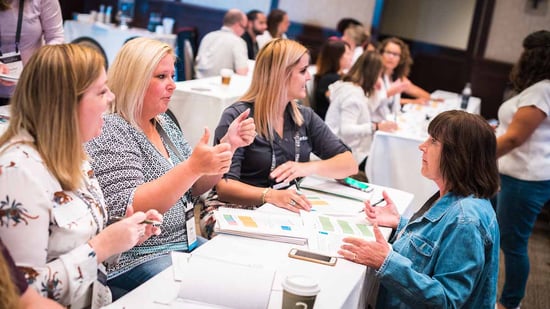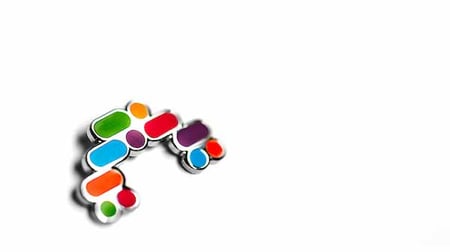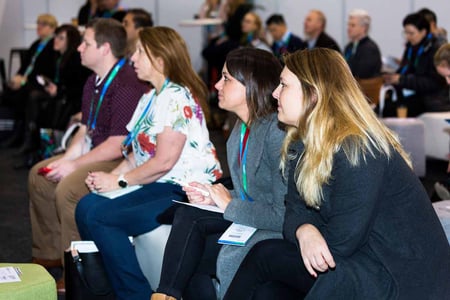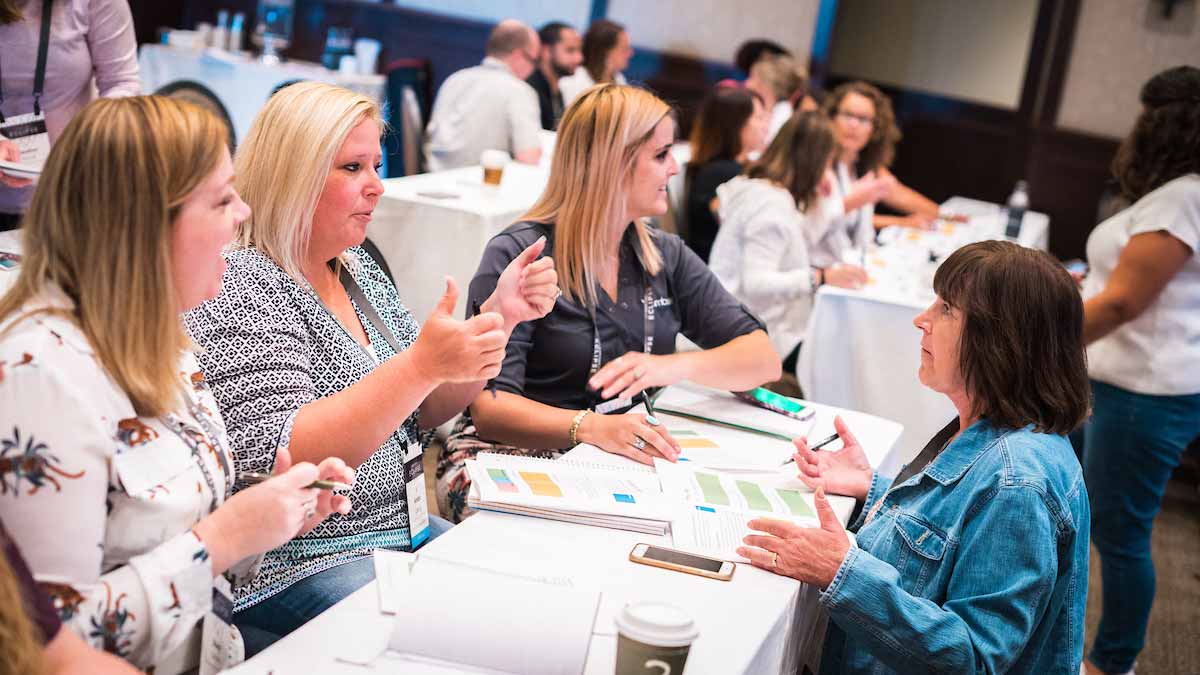
6 min read
After years of working alongside and writing about the world of HR, I was recently lucky enough to my first HR convention two weeks ago. This was my first time spending three full days attending HR workshops, speaking with HR professionals all day on the exhibition floor, and watching HR thought-leaders take the stage. I had no idea what to expect. And you know what? I was blown away!
I walked away with new insight into what is challenging and changing in the HR industry. I was introduced to brand new ideas and also received timely reminders of how important it is to listen to, learn alongside and partner with the “people who take care of the people” in our companies. I took pages worth of notes, but instead of sharing all of them, here are some of my highlights.

1. You are a guardian of humanity
Before you scoff at the idea of giving HR professionals superhero status, it’s actually one of my favourite points from Charles Handy’s keynote “A Letter to My Grandchildren.” Paraphrasing Aristotle, he said "Do the best at what you're best at for the good of others." Hands down the best advice for every professional in the auditorium - and for every business for that matter!
As organisational models evolve to cater for more geographically dispersed but digitally connected operations, it’s more important than ever not to treat people as ‘resources’ but as individuals with intrinsic value. Know them by name, understand what drives them, and what connects them with each other.
When we understand the importance of identifying, guiding and supporting people through change – be it cultural, organisational or even personal – then we’re able to make the biggest contributions not just to our organisations, but to society as a whole.
2. Don’t fall into the competency trap
Ever find yourself gravitating towards certain tasks because you know you can get it done? Have you ever stopped to ask yourself if completing those tasks is really the most valuable thing you can do today?
In her keynote, Herminia Ibarra, Professor of Organisational Behaviour at London Business School, warned us to be mindful of those moments when we pick up easy jobs instead of tackling the bigger problems that require us to step out of our comfort zones. If we want to grow as HR leaders and prepare our companies for the future, then we need to redefine what is important on our task list.
So, if you know employee engagement is something you’ve been meaning to tackle this year but it’s been thrown in the “too hard” basket time and time again, now is the time to revisit it and consider which elements of the Engagement Bridge™ you can start working on. It's not too late to start. If anything, NOW is the time to start! You don’t have to try solving the problem in one week (you can’t!), but you can make a start on one step and build as you go.

3. Start small, then spread quickly... like a virus
I loved the analogy that Claire Rogers, CEO, World Vision, used to describe some companies.
Organisations are exceptionally good at maintaining the status quo… like an immune system, they reject anything they consider to be an intruder.
While our immune system is generally great at defending our bodies against threats, the problem with change-resistant organisations is they often get stuck into a sluggish cycle of complacency. To shake things up, Claire suggests introducing small ideas into single teams or departments “before the immune system can respond” and, as your ideas start to gain traction, recognise and share the success stories daily and allow the excitement to generate excitement and velocity. The idea is for your HR initiative to go viral - in a good way.
4. Create a space where people can people can fail safely
The great thing about starting small is that employees feel like they can experiment safely, without fear of major expense, risk or heavy-handed reprimand. If you know your organisation needs stronger, resilient leaders with a mindset for growth – you need to be willing to give your people the chance to play more, fail fast and move on quickly.
To do this, encourage a “learn it all” instead of a “know it all” attitude with yourself and your team. Create channels where people can provide candid feedback - be it in a staff survey, your team meeting, or a dedicated Slack channel. Encourage knowledge sharing with casual lunch-n-learns, or give employees free access to books or other professional resources. And when people give something a red hot go, recognise the effort and the progress (even if they don’t hit the goal 100%), so they gain confidence and, importantly, repeat the behaviour.

5. Be less of a hub and more of a bridge
When we act as "hubs," we stand at the centre and lots of people come to us for a solution to their problem. Whether you're a HR coordinator or the Managing Director, it’s tempting (and almost natural) to be a hub because we are usually the person people think of if they can't find what they're looking for. You're likely to be the one who can get what needs to be done, done.
But, much like the ‘competency trap’, the risk of acting as a hub means we spend too much time in the day-to-day transactional tasks instead of the 'big picture,' game-changing initiatives.
If, instead, we act as a bridge – someone who can connect the person with the problem to the information they need – then we shift the responsibility of fixing the problem to the owner, and we can focus our time and effort on more important things.
This attitude is particularly important when launching a new HR initiative. For example, if we behaved like a ‘hub’ when designing and launching an employee recognition and reward program, we’d design it so HR could approve every eCard and award before it was ever received. Sure, that’s great for maintaining control, but administration would be terribly time-consuming and it would make for a poor employee experience.
If we approach these types of programs as a ‘bridge’, we could give employees and managers more freedom in how they recognised and rewarded each other, and instead focus our time on educating them on how to do it effectively.
Being a bridge means relinquishing some control, but the benefit means sharing the accountability across your organisation.
6. You should always be slightly stressed
Ever get that feeling of exasperation because you feel like your job is never done? Perfect! Because, according to Charles Handy, that stress means you’re pushing and stretching yourself, and that’s actually a good thing because it means you’re forcing yourself to learn and evolve.
No, this isn’t the same as working endless hours and burning yourself out – setting boundaries and knowing your limits is very important. But, instead of seeing stress as a negative, it can help to see stress as a friend (unsure how this works? Check out Kelly McGonigal's TED talk). Setting stretch goals is also important for your own sense of personal and professional fulfilment.

7. Always be learning
And speaking of that sense of personal and professional fulfilment; look outside your current networks and learn from people who challenge your thinking and or read books that introduce new ways of doing things. It's one of the best ways to learn! And, since learning was actually up there as the number one priority for HR professionals at AHRI this year, it's important to find ways to build learning into how you operate everyday.
In addition to learning from some of the speakers, I received a lot of wisdom in the exhibition hall while talking to other attendees about the challenges they are facing in their own organisations. Some shared about what they've done to close the employee engagement gap, introduce a introduce a creative employee benefit or start to build a culture of recognition into their business.
>To help me keep learning too, I’d love you to find us on LinkedIn and tell us about your favourite session from the event, or, if you weren’t at AHRI, share one of the biggest and best lessons you’ve picked up at recent events or from a book that you’ve read.
That always-be-learning attitude is probably one of the most valuable traits any HR professional can have, since the industry is always evolving as the people we work with evolve.
There were plenty more lessons I learnt at the convention that I will share in future blog posts, so if you want to keep up, make sure you subscribe so you can catch them all in your inbox in the future!
 Joy Adan
Joy Adan

